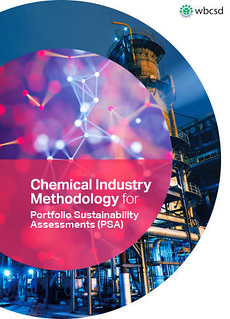http://e-info.org.tw/node/211260?utm_source=%E7%92%B0%E5%A2%83%E8%B3%87%E8%A8%8A%E9%9B%BB%E5%AD%90%E5%A0%B1&utm_campaign=7baffeb8d4-EMAIL_CAMPAIGN_2018_04_17&utm_medium=email&utm_term=0_f99f939cdc-7baffeb8d4-84956681
全球首部 化學業「產品永續性評估」指南出爐
摘譯自2018年4月19日ENS日內瓦報導;姜唯編譯;林大利審校
世界企業永續發展委員會(WBCSD)為化學產業推出首本永續指南《化學業產品組合永續性評估方法論》,幫助化學業評估其產品組合的永續性「指標」,進而調整投產品組合,改善永續性。
這些指標包括化學物質終其生命週期所產生的化學危害和暴露、可預期的監管趨勢、環境和社會影響、市場認知和聯合國永續發展目標。

WBCSD在2017年推出《產品組合永續性評估綱要》(Framework for portfolio sustainability assessments,PSA),4月18日推出的指南是為此計畫的延續。該機構18日發表《指南》時表示,若根據這份指南調整產品組合,化學業可以做出更好的決策,訂定更堅實的策略。包括阿克蘇諾貝爾、巴斯夫、科萊恩、科思創、帝斯曼、伊斯曼化學、贏創工業、SABIC和索爾維等企業均協力參與,幫助整個化學工業及其利害關係者評估和瞭解產品組合。運用這些指標,企業可以透過各種職能,包括研發、併購、創新、市場行銷、溝通和設計等,來提高永續性。
化學品公司經常受到環保團體的批評,因為它們常常生產危害人類健康和環境的物質,並且污染了其生產廠房周邊的環境。
提高產品永續性透明度 巴斯夫追求導入區塊鏈技術
例如,德國跨國化學公司巴斯夫是世界上最大的化學塑膠軟化劑鄰苯二甲酸酯(PAEs)生產商之一,受到地球之友德國分會和綠色和平組織等組織強烈批評,因為最近的研究發現,鄰苯二甲酸酯會干擾人類的生殖能力。
巴斯夫在2013年也飽受攻擊,當時該公司加入化學公司拜耳和先正達的陣營,挑戰歐盟限用危害授粉昆蟲的殺蟲劑,像是對蜂類來說是劇毒的芬普尼。普芬尼對人體也有害,並和哺乳動物的內分泌干擾、甲狀腺癌、神經毒性和生殖能力有關。
然而現在,巴斯夫正致力追求永續。今年3月帝王斑蝶北遷時,巴斯夫透過內部的帝王斑蝶計畫,鼓勵農家在遷徙路線上種植乳草,供帝王斑蝶休息停留。
巴斯夫永續發展策略經理席林(Chip Shilling)表示:「巴斯夫正在與他們(農家)合作,在他們土地上非作物地區建立乳草棲地 。我們希望透過帝王斑蝶這樣的計畫,幫助復育和保護帝王斑蝶的族群,同時展示乳草如何與現代農業一起蓬勃發展。」
今年4月,巴斯夫和arc-net宣布了一項合作,要利用區塊鏈技術來捕捉和分析價值鏈中畜牧生產的永續性參數。 arc-net是一家科技公司,利用區塊鏈技術幫農業食品行業提升透明度。作為此次合作的一部分,巴斯夫將利用為其量身訂做的運算工具AgBalance™Livestock提供有關動物生產價值鏈環境影響的科學資料。

不只個別企業 產業協會也加入永續行列
代表全球化學品製造商和生產商的國際化學工業協會(ICCA)也加入了邁向永續的行列。
ICCA加入了聯合國環境組織的 #BeatPollution 倡議,並致力於擴大其自發性的責任關懷計畫,以「減少排放並提高全球安全管理化學品的能力」來對抗污染。
雖然所有測試WBCSD指南的公司都在努力擴張涵蓋的業務範圍和報告範圍,目前並沒有看到成功的單一途徑。相反地,指南指出,各個企業以不同的方式邁向目標。
1.企業可以開始從各種商業活動著手,並逐漸增加報告的範圍。
2.另外,企業可以選在試辦業務中導入PSA(產品組合永續性評估),達到一定的品質和細節水準後,再推廣到其他業務。
3.結合上述方法,企業的產品開發路徑圖可以預見PSA實施範圍和細膩度的升級,進一步擴大涵蓋的業務範圍。
4.併購可能導致涵蓋業務範圍暫時減少,以及/或者可用資料的詳細程度或品質暫時降低。
5.儘管大多數公司都努力擴大涵蓋的業務範圍以及資料的細膩程度,但大多數公司都發現目標會不斷改變,因為利害相關者的需求會隨時間變化。
這份指南發表後,WBCSD表示,其成員企業將能彼此分享最佳實踐和經驗,並得以藉此獲益。
Chemical Industry Reaches for Sustainability
The World Business Council for Sustainable Development, WBCSD, is launching a first-of-its-kind guidance for the chemical industry to help the industry assess sustainability "signals" across their entire product portfolio, then steer their portfolio towards improved sustainability outcomes.
These signals include chemical hazard and exposure along the life cycle of a substance; anticipated regulatory trends; environmental and social impacts, market perception and the UN Sustainable Development Goals.
This Methodology provides specific guidance for the chemical industry that builds off the WBCSD's Framework for Portfolio Sustainability Assessments, PSAs, released in October 2017.
 Companies that are steering their portfolios are finding that they can make better decisions and develop more robust strategies, the WBCSD said in a statement on Tuesday, announcing the Chemical Industry Methodology for Portfolio Sustainability Assessments.
Companies that are steering their portfolios are finding that they can make better decisions and develop more robust strategies, the WBCSD said in a statement on Tuesday, announcing the Chemical Industry Methodology for Portfolio Sustainability Assessments.
Companies that follow this guidance "have a higher growth rate for more sustainable solutions; provide credible communication on sustainability benefits; develop stronger customer and stakeholder relationships; reduce risks across a range of issues; and improve their corporate image," says the WBCSD.
AkzoNobel, BASF, Clariant, Covestro, DSM, Eastman Chemical, Evonik Industries, SABIC and Solvay collaborated to provide guidance that the wider chemical industry and its stakeholders can use to assess and understand the product portfolio.
Using these signals, companies can direct efforts to improve sustainability across various functions, including research and development, mergers and acquisitions, innovation, marketing, communication and design.
Chemical companies frequently come under criticism by environmental groups for producing substances that harm human health and the environment and doing so in ways that pollute the environs of their production facilities.
The German multinational chemical company BASF, for instance, is one of the world's largest producers of chemical plastic softening agents, phthalates. Friends of the Earth Germany and Greenpeace, among other groups, have criticized BASF for producing these products, since recent studies have shown that phthalates can interfere with human reproductive capacities.
BASF also attracted criticism in 2013 when the company joined chemical companies Bayer and Syngenta in challenging the European Union's decision to restrict the use of pesticides that are harmful to pollinators, such as Fipronil, which is highly toxic to bees.
Fipronil is also harmful to humans and has been linked to hormone disruption, thyroid cancer, neurotoxicity and reproductive effects in mammals.
Now, however, BASF is reaching for sustainability. In March, as monarch butterflies prepared to fly north, BASF encouraged farm families to provide a layover for them by planting milkweed habitats along the migration path as part of the company's Monarch Challenge.
"BASF is partnering with them to establish milkweed habitats in non-crop areas of their land," said Chip Shilling, BASF Sustainability Strategy Manager. "We hope programs like the Monarch Challenge can help restore and preserve the monarch population for future generations, while demonstrating how milkweed can thrive alongside modern agricultural practices."
In April, BASF and arc-net, announced a collaboration focused on using blockchain technology to capture and analyze sustainability parameters in livestock production along the value chain. arc-net is a technology company utilizing blockchain technology to provide transparency in the agri-food industry. As part of this collaboration, BASF will use its tailored calculation tool, AgBalance™ Livestock to provide science-based information on environmental impacts along the animal production value chain.
"Venturing into this collaboration with arc-net is a key milestone in our efforts to enable our customers to grow sustainably," said Alexa Beaver, Digital Innovation, BASF. "We never stop thinking about what more we can do to create valuable sustainable measures, and this project is a great step forward."
The International Council of Chemical Associations, ICCA, which represents chemical manufacturers and producers worldwide, is on board with the industry's new sustainability direction.
The ICCA has joined UN Environment's #BeatPollution initiative and commits to combatting pollution by expanding its voluntary Responsible Care program to "reduce emissions and increase global capacity to manage chemicals safely."
Although all companies testing the WBCSD guidance were found to strive for broad coverage of business activities and increased scope of reporting, no single pathway to successful implementation was identified. Instead, the guidance states, companies were found to advance in different ways towards their goal.
1. Companies may start by involving a broad range of business activities and gradually increase the scope of reporting over time.
2. Alternatively, companies may opt to introduce PSAs in a pilot business and realize an adequate level of quality and detail before further rolling out to other businesses.
3. By combining above approaches, companies may implement a roadmap which foresees in alternating upgrades in scope and granularity, with further expansions of business coverage.
4. Mergers and acquisitions may result in a temporary reduction of business coverage and/or a temporary decrease in the level detail or quality of available data.
5. Although most companies strive to achieve a high coverage of business activities with an adequate level of detail in the assessments, most companies experience that the end goal is a moving target, as stakeholder requirements change over time.
Following the release of this guidance, WBCSD says its member companies will build from these efforts through the sharing of best practices and lessons learned.
※ 全文及圖片詳見:ENS



沒有留言:
張貼留言